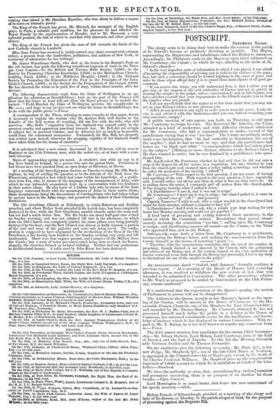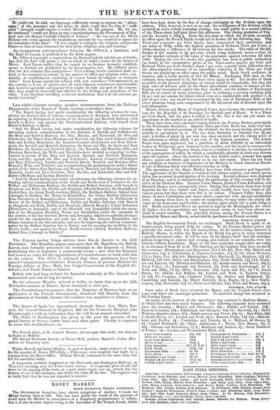Bishop French, of Kilmacduagh, presided at a meeting of the
clergy and laity of his diocese, on Monday, in the parish-chapel of Gort, for the purpose of protesting against the Bequests Bin, He could not, he said, use language sufficiently strong to express his abhor- reale " of the measure; and the terms he chose imply that his idea of " suffi- cient " strength would require a verbal Hercules for the purpose. He for one, he continued, "could not listen to any connexion between the Government of Eng land and the Roman Catholic Church of Ireland." " He was one of the fifteen Bishops who voted against the measure—a measure he was resolved to oppose for the remainder of his days." "It was sought to extirpale the religious orders—the friars—a class of men renowned for their piety, religious zeal, and learning."
An inopportune correspondence between Mr. O'Dowd, a barrister, and the Earl of Lucan, is published in the Irish papers. Mr. O'Dowd transmits a request from the Roman Catholic inhabitants of Castle- bar, that the Earl will grant a site on which to build a house for the Sisters of Mercy. Lord Lucan replies that he cannot do so, because monastic establish- ments in Ireland are prohibited by the Emancipation Act. Mr. O'Dowd shows that the Act contains this exemption—" That nothing herein contained shall ex- tent; or be construed to extend, in any manner to affect any religious order, corn- humity, or establishment consisting of women bound by religions or monastic Wm." Lord Lucan repeats his refusal, with new reasons—" Circumstanced as the country is, I am of opinion that all such religious societies are objectionable; kid, however agreeable and popular they might be with one part of the column- ifity, they might be distasefnl and offensive to the feelings and prejudices of the other. I am therefore unwilling to favour institutions that I do not consider ge- nerally beneficial."



























 Previous page
Previous page